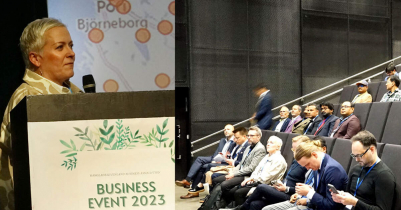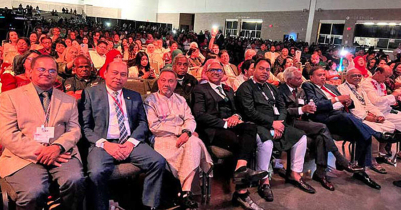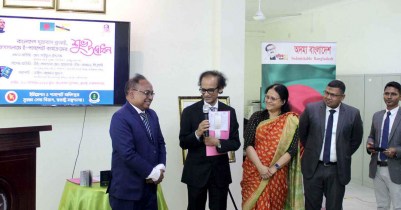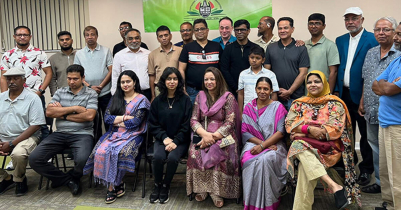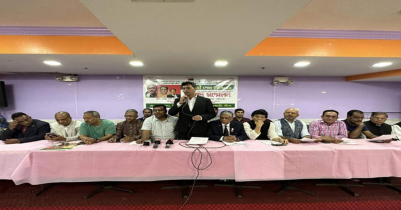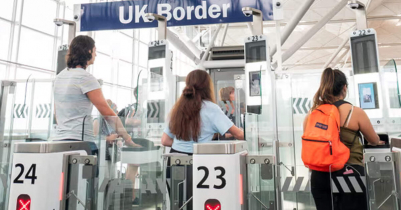Probir Kumar Sarker
Bangladesh is eager to forge a dynamic partnership with Canada
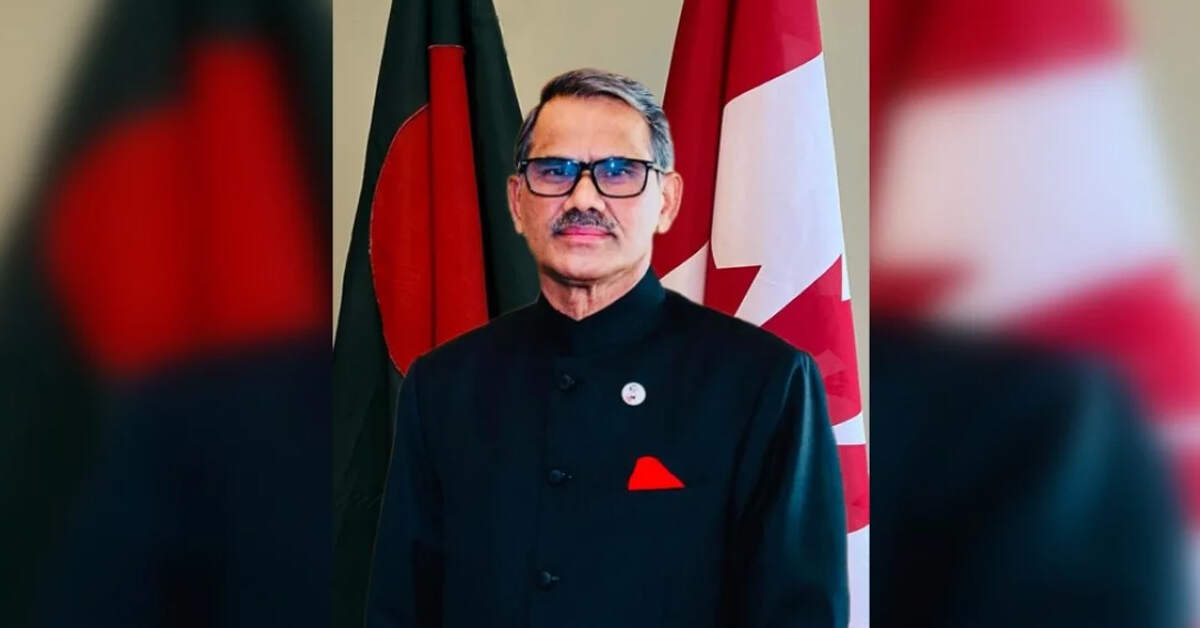
Canada is a longstanding partner in Bangladesh's development and plays a greater role in global peace and prosperity. Bangladesh also has cooperation with the Caribbean Island nations in different fields.
Dr Khalilur Rahman, the High Commissioner of Bangladesh to Canada, Trinidad and Tobago, the Bahamas, Cuba, and Nicaragua, shares his insights on the status of bilateral relations, the Rohingya crisis, and scopes in trade and investment, tourism, education, and counterterrorism, for our readers in an interview with Probir Kumar Sarker. Dr Khalilur, who is also the Permanent Representative to the UN International Civil Aviation Organization, previously served in various capacities in the Foreign Ministry as well as in the Bangladesh High Commission in New Delhi and the Bangladesh Permanent Mission in Geneva.
- Where does the Bangladesh-Canada friendship stand 51 years after the establishment of diplomatic relations?
Dr Khalilur Rahman: Canada was not only one of the first countries to recognise independent Bangladesh, the Canadian government and people supported our glorious War of Independence in 1971. Since diplomatic relations were established on February 14, 1972, Canada has been supporting Bangladesh in many areas. The bilateral relations between the two countries received momentum following the visit of the Father of the Nation, Bangabandhu Sheikh Mujibur Rahman, to Canada in 1973 in connection with the Commonwealth Summit, and a special bond of friendship blossomed between him and the then Canadian Prime Minister, Pierre E Trudeau, who incidentally is the father of the current Prime Minister of Canada, Justin Trudeau. This bond of friendship and personal rapport has transcended to their able daughter and son, the current Prime Ministers of Bangladesh and Canada. This was further strengthened when the Hon’ble Prime Minister Sheikh Hasina visited Canada in 2016 to attend the Fifth Global Fund Replenishment Conference and in 2018, to attend the "Leaders Outreach Session" of the G-7 Summit at the invitation of Canadian Prime Minister Justin Trudeau. The personal rapport and the common understanding between the two leaders on many global issues are two of the strengths of the existing friendly relations between the two countries.
Canada’s development efforts in post independent Bangladesh mainly involved reconstruction, rehabilitation, primary education, agriculture, rural development, water management, healthcare, and governance, followed by poverty alleviation, women’s economic empowerment, skills development for youth, and overall socioeconomic development. Bangladesh and Canada have meaningful cooperation in the international fora while working on women's empowerment, climate change, migration, development assistance, regional security, and refugee issues. Canada greatly values Bangladesh’s role in the regional setting involving connectivity, economic cooperation, and counterterrorism issues. Bangladesh’s commitment to implement the Ottawa Convention (Anti-Personal Land Mine Ban Treaty) and its support during the elaboration of the Statute for the International Criminal Court as well as the UN Security Council resolution on Women, Peace, and Security have further cemented its political relations with Canada. Bangladesh's commitment to promoting democracy, women's empowerment, and its contribution to global peace, security, and development is appreciated by Canada and the international community. Canada's involvement in the Rohingya crisis, particularly since 2017, is also commendable. The people-to-people links between Bangladesh and Canada are significant and expanding. The Bangladeshi Canadian community contributes significantly to Canadian society and multiculturalism, which is appreciated in Canada.
Canada has provided over $4 billion of international assistance to Bangladesh since 1972. However, with the growing economic capacity of Bangladesh, especially under the leadership of Hon’ble Prime Minister Sheikh Hasina in the last one and a half decades, development assistance is no longer the defining factor of our bilateral relations. Our relationship is now multidimensional and encompasses trade, investment, development partnerships, education, and people-to-people contact. Trade between the two countries now stands at its highest level in history. Similarly, our export to Canada also stands at its highest, at $2.02 billion at the end of 2022, an increase of almost 72% over the last two years.
A Canada-Bangladesh Parliamentary Friendship Group has been established to work and interact with the similar Group in the Bangladesh Parliament, to contribute from policy perspectives for overall promotion of bilateral relations between the two countries. The Group would soon visit Bangladesh to meet their counterpart.
- What is Canada doing to help Bangladesh solve the Rohingya refugee crisis?
Ever since the massive influx of forcibly displaced Myanmar nationals to Bangladesh started in 2017, Canada has come forward to support humanitarian needs and resolve the Rohingya issue. Canada appointed a Special Envoy to address these issues. In 2021, Canada approved an allocation of CAD 320 million (or USD 244 million) for three years to support the humanitarian needs of the Rohingyas camped in Bangladesh. At the International Court of Justice (ICJ), Canada has pledged to work with Gambia to hold Myanmar accountable for genocide and crimes against humanity against the Rohingyas. The visit of the Hon’ble Harjit Sing Sajjan, the then Hon’ble Minister of International Development (now President of the King’s Privy Council for Canada and Minister of Emergency Preparedness and Minister responsible for the Pacific Economic Development Agency of Canada), to Bangladesh in February 2023 is another vindication of Canada’s commitment to the issue.
However, our western allies, including Canada, have recently shifted their focus to restoring democracy in Myanmar, rather than repatriating the Rohingyas to their motherland, Rakhine State in Myanmar. They are not showing the required interest to compel the current government in Myanmar to repatriate. We have differing views with Canada on the issue of Rohingya repatriation. I feel that neither Bangladesh nor the Rohingyas should fall into the trap of the so-called "Democracy First" policy being promoted by our western friends, including Canada. At the same time, they are also using the pretext of safety and sustainability of Rohingyas in Rakhine State following repatriation, without putting any effective pressure on Myanmar to ensure the same.
Canada appointed Hon’ble Bob Ray as Special Envoy for Rohingyas immediately after the crisis started in 2017. However, for the last few years, there has not been any special envoy, although the Canadian government announced in September 2022 that a new special envoy would be appointed soon. The non-appointment of the Special Envoy almost one year after the announcement indicates Canada’s dwindling position on the issue of repatriation. We are trying to persuade them to play a more active role in the issue as well as to commit additional financial support to Rohingyas to meet their humanitarian needs and to support the case in the ICJ against the persecutors and those who committed crimes against humanity and genocide against the Rohingyas. Until now, Canada has been providing only some legal support to the issue without committing any funds to support the case in ICJ. Even if the UN reduced daily rations for Rohingyas, Canada did not come up with additional support to meet the humanitarian needs of the Rohingyas.
In this connection, it should be noted that Bangladesh alone spent a staggering $1.69 billion solely in 2022 to support the Rohingyas, a sum far greater than any other country or organization contributed during the same period. No country or organization has even spent 10% of this amount in 2022. We feel that Canada should come forward with additional financial support to manage this humanitarian crisis.
It is an overwhelming need and expectation from the Rohingyas as well as from Bangladesh that as many as possible, the forcibly displaced Rohingyas who are now temporarily sheltered in Bangladesh, be resettled in Canada like all other displaced groups of population from other countries, without any discrimination. Rohingyas deserve to be resettled in countries like Canada, like other displaced groups of people from Ukraine, Syria, Afghanistan, and other countries, in a non-discriminatory way. At the same time, the western governments must also control the misinformation campaign and propaganda involving the Rohingyas in camps.
Bangladesh looks forward to working closely with Canada and other developed nations for the early repatriation of Rohingyas with safety and dignity, to their homeland, Rakhine State in Myanmar. Pending their repatriation, we would like Canada to continue with adequate humanitarian support and accept Rohingyas for resettlement in Canada. What is happening now about the resettlement of the Rohingyas in Canada is just on a "pick and choose" basis, and their number is too small and insignificant. However, we are working with the government of Canada and the Rohingya community in Canada on this issue.
- Currently, Bangladesh and Canada have a trade of $3 billion per year. How can Bangladesh draw more Canadian investments to different sectors?
Despite the challenges posed by the Covid-19 pandemic and other global issues, bilateral trade between Bangladesh and Canada has been steadily growing, reaching its highest ever at $2.02 billion USD in exports to Canada since I assumed charge as High Commissioner in 2020.
After joining the Mission, I worked with the Canadian side and established a Joint Working Group (JWG) comprising business leaders from both countries, dedicated to strengthening commercial relations. The JWG has already submitted its recommendations to both governments, aiming to promote trade and investment between the two nations. By implementing some of these recommendations, we expect to expand and strengthen our trade ties. Moreover, we worked hard and have been able to successfully start operation of the direct Biman flights between Dhaka and Toronto. It has been proved a huge success and it is promoting mobility, people-to-people connections and boosting trade and business collaborations. Once we can secure the fifth freedom traffic right for Biman and establish code-sharing agreements with Air Canada and other airlines, our trade relations with Canada will be further bolstered.
Moreover, the High Commission is also working with the Canadian side for the continuation of our preferential market access to Canada beyond 2026 following our graduation to make our transition smooth and sustainable and to keep our export competitiveness in the Canadian market. We have also proposed to Canada that it negotiate a Free Trade Agreement.
However, in terms of attracting Canadian investment, we have had mixed success. One of the critical issues hindering Canadian investment in Bangladesh is the absence of a Foreign Investment Protection Agreement (FIPA) between the two countries. The lack of FIPA has made Canadian investors hesitant to explore opportunities in Bangladesh. We recognize that the responsibility for this lies mostly on our side, as discussions on concluding the FIPA started in 2012. However, unfortunately, Bangladesh has been unable to propose a draft for the document, even though we managed some outlining of the document from Canadian authorities and shared the same with our authorities in Dhaka to help them draft the document. Even then, we failed to produce a draft for it. This is a gross failure on our part. On the other hand, we must acknowledge the fact that Canadian investors often prefer countries with which Canada has concluded FIPA to ensure their investments are protected. Naturally, in the absence of FIPA with Bangladesh, they feel discouraged from investing in Bangladesh, even though it is known to them that Bangladesh is an attractive investment destination. The Mission has been constantly pursuing the matter with authorities concerned in our government. It is expected that once we successfully negotiate and conclude the FIPA, Canadian investors will receive the necessary assurance and confidence to invest in Bangladesh. Despite all this, Mission is undertaking various initiatives to attract Canadian investment in Bangladesh by reaching out to business bodies and individual investors who project Bangladesh as a lucrative investment destination.
Currently, a Canadian company is reinvesting US$750 million, which would create over 7,000 jobs in the apparel sector. We have planned an investment seminar in Toronto in collaboration with the Ontario Chamber of Commerce to attract Canadian investment to Bangladesh.
- What are the opportunities for Bangladeshi nationals, including businessmen, professionals, and tourists, in the Caribbean island nations?
As the concurrently accredited non-resident Ambassador to Trinidad and Tobago, Cuba, the Bahamas, and Nicaragua, I feel that the Caribbean region has not received the attention it deserves from Bangladesh in terms of identifying non-traditional markets for our products. Every year, a substantial amount of money is being syphoned off from Bangladesh to these Caribbean countries, which can be stopped by strengthening and expanding our diplomatic ties.
Since I assumed charge, I have been working with the Foreign Offices of these countries to conclude Memorandums of Understanding for regular consultations to explore mutually beneficial sectors. We have significant scope to increase our export volume to these countries. There was a time when Bangladesh used to export jute to Cuba after our independence. In a bid to resume these trade ties, I am connecting the Chamber of Commerce of the Republic of Cuba with the FBCCI. Our efforts have led to linking some sourcing companies, particularly those in the garment, leather, and jute industries, with importers in these Caribbean nations. Furthermore, we are planning a trade delegation from Bangladesh to visit one of these countries, where there is tremendous potential for exporting jute and jute products, along with garments and leather products. I have already informed our Ministry of Commerce about these opportunities, and a trade delegation may soon visit Cuba. I have also spoken to business houses and our Chamber about the existing opportunities, and we are trying to connect them with chambers and businessmen in these countries.
In addition to trade, we are actively engaged with the authorities concerned in our government to consider concluding Air Transport Agreements with some countries in the Caribbean, along with code-sharing arrangements between Bangladesh Biman and their national airlines. This move aims to promote mobility, enhance people-to-people connections, and foster business-to-business links.
Lastly, given the shared vulnerability to climate-related challenges faced by these countries in the Caribbean region, we are exploring opportunities for collaborative efforts in the global forums to combat this crisis and work closely on the climate agenda. By sharing our climate resilience initiatives, both sides can benefit and contribute meaningfully to addressing climate change.
I also proposed to have some kind of MoU on financial transactions between Bangladesh and some Caribbean countries to control money laundering and capital flight to those countries. I feel that the permission given to some of our business houses to invest abroad deserves review to control money laundering by misusing this permission. One of the major shortcomings of this permission, in my view, is the lack of effective monitoring mechanisms for the proper implementation and use of this permission as per its provisions, as well as their operation and the volume of money they are investing abroad.
- How can Bangladesh benefit from Canada’s Indo-Pacific Strategy while maintaining its foreign policy of ‘friendship to all, malice to none'?
Guided by the Father of Nation’s foreign policy dictum, "Friendship to All, Malice to None," Bangladesh released its Indo-Pacific Outlook in April this year. This strategic document aims to deepen sub-regional partnerships, ensure maritime security, combat transnational crime, and achieve sustainable development and supply chain resilience.
Remarkably, Bangladesh's Indo-Pacific Outlook aligns seamlessly with Canada's Indo-Pacific Strategy (CIPS), presenting a unique opportunity for both nations to collaborate as active partners in the region. By coming together, we can effectively build resilience against changing dynamics, expand trade and investment, and strengthen supply chain resilience in line with the vision of the CIPS and our Indo-Pacific Outlook. However, the required focus was not given to Bangladesh in the CIPS. Bangladesh is mentioned in their strategy mostly from the perspective of the Rohingya crisis, which I feel is unfortunate and not well thought out. Their strategy missed the geopolitical and economic importance of Bangladesh. Also, the strategy has not given the necessary importance to promoting regular and smooth migration, mobility, and people-to-people contact between the two countries. Bangladesh’s long-standing request and demand for the relocation of the Canadian Visa Centre to Dhaka has also not been mentioned in their strategy. On the other hand, the strategy did mention setting up new Canadian Visa Centres in two bigger countries in South Asia. This important issue has been raised with the Canadian authorities with a renewed request for the relocation of the Canadian Visa Centre in Dhaka as soon as possible.
Despite that, Bangladesh is eager to forge a dynamic partnership with Canada, focusing on crucial areas such as the blue economy, sustainable infrastructure funding, biodiversity protection and conservation, food security and agricultural technology, energy transitions, and climate finance. These shared objectives pave the way for meaningful cooperation and progress in the Indo-Pacific region. Moreover, Bangladesh stands ready to share its invaluable expertise in natural disaster resilience and locally-led climate adaptation practises. By promoting clean technology and undertaking joint initiatives to prevent and mitigate the impacts of climate change, both nations can lead by example in addressing the global challenge.
This collaborative approach does not entail confrontation with any of our other valued partners, including China and Russia. Instead, it emphasises mutual cooperation to achieve peace and prosperity for all parties involved. We are also discussing whether some security cooperation mechanisms can be set up under the CIPS.
- What is Canada’s stance on the new visa policy declared by its ally, the USA, for Bangladeshi individuals obstructing a fair election?
Canada is one of the most developed countries in the world. It has well developed policies, rules, and regulations on every issue. Their visa policy is also well structured, and there is a system for a thorough background check for every visa applicant. Canada is capable enough to take its own decision on the visa issue without being advised by others. They trust their system and have confidence in their own visa policy, and they should be continuing with the same without linking it with anything. On one occasion, I was told that Canada follows its own independent policy, and they are aware of some misrepresentations about Canada’s visa policy published in some Bangladeshi media. However, not only as the High Commissioner, but as an ordinary citizen of Bangladesh, I wish that Canada and other developed countries, along with the USA and the UK, could control visas for convicts, charge-sheeted money launderers, and loan defaulters and introduce an effective mechanism to check the source of their money before issuing visas to them.
- As a member of the US-led Media Coalition Forum, Canada participated in issuing several joint statements regarding Bangladesh’s politics and elections. How much is the Canadian government concerned with Bangladesh’s pre-election situation?
First, we respect the provisions of the Vienna Convention on Diplomatic Relations and transact our business following the same strictly. I never talk about the domestic politics of Canada, and I always consider this interference in the international affairs of a sovereign host country. What we see in Dhaka from the envoys of some developed nations is primarily their judgement. I am also aware of the joint briefing provided to them by our Hon’ble State Minister on such issues. I called it "Diplomatic Activism" that we observe these days among envoys of some powerful nations. But the fact remains that every country is sovereign, and every country should be allowed to decide on titsown fate without any interference from any foreign countries. In this connection, I swouldlike to add one thing. Since the mid-1980s, if not earlier, developed countries have started interfering in the internal affairs of developing countries under the pretext of different kinds of rights for their convenience. However, it is primarily done to safeguard the national and group interests of those countries. Otherwise, they would not have been oblivious to so many flagrant violations of human rights in so many countries and regions around the world. They have hardly any interest in those countries, as their interests are being protected there. We can even observe this in our region too.
From the Mission’s part, we always keep the Canadian government informed about any latest political developments and provide them, along with some Hon'rable Senators and MPs, with any information or explanation on any issue of interest to them. I have quite regular contact with my counterpart in Dhaka, and we both agree to promote and deepen existing friendly relations between the two countries. We also have regular contact and good understanding with colleagues in Global Affairs Canada, and we appreciate our respective compulsions and limitations on certain issues. At the same time, we are committed to furthering our long-standing and time-tested friendly and excellent bilateral relations.
On the issue of the next general elections, we request that Canada work with Bangladesh to hold free, fair, and peaceful elections. In line with the discussion held between the Hon’ble Prime Minister and the Commonwealth Secretary General in May 2023 in London, as a leading Commonwealth country, we also proposed to the Canadian government to send a "diversified" group of observers to monitor the next general election of Bangladesh. We also feel that Canada is quite willing to help and work with Bangladesh to hold a free, fair, and peaceful election. On the other hand, a member of the Canada-Bangladesh Parliamentary Friendship Group requested that the House of Commons work with the government of Bangladesh for this purpose. Recently, we came to know that a conscious group of Bangladeshi Canadians has also urged the Canadian government for the same purpose. All this is done to promote the existing excellent relations between the two friendly countries.
- What is Canada’s official response to Bangladesh’s call for the deportation of Bangabandhu's killer, Noor Chowdhury? Can Canada try him in court for the conviction in Bangladesh?
Our Hon’ble Foreign Minister and the Foreign Ministry Spokesperson made a statement at the beginning of the Month of Mourning on this issue. I would add that we all should know that the three major countries in the world that claim to promote rule of law, defend human rights—the USA, the UK, and Canada are sheltering war criminals, money launderers, convicts, and, of course, the heinous killers of the Father of the Nation Bangabandhu Sheikh Mujibur Rahman and his 18 family members. It is unfortunate that despite our relentless efforts to engage in meaningful dialogue with Canada regarding the deportation of the heinous killer and flagrant violator of human rights, Nur Chowdhury, we find that Canada appears to be more concerned about the rights of this convicted killer than the rights of the victims and their families to get justice. To me, it is contradictory to Canada’s strong stance on upholding the rule of law and defending, protecting, and promoting human rights. Unfortunately, whenever the issue of deportation is raised with the Canadian government, legal complications and compulsions are presented to us. However, it is pleasing to note that our Canadian friends appreciate that this is a very important issue and are open to engaging in dialogue to resolve it. We are working closely to explore all the possibilities and precedents to find a mutually acceptable solution to this 28-year-old unresolved issue. As High Commissioner, I am hopeful that we should be able to resolve the issue sooner than later with the required efforts and strong determination from all quarters concerned.
What is your evaluation of the Bangladeshi students and professionals living in Canada? How easy is it to enrol in Canadian colleges and universities for higher studies?
Bangladeshi students and professionals living in Canada are highly regarded for their significant contributions to Canadian society and the economy. They are esteemed members of Canada's multicultural fabric and are contributing to Canadian society in varied forms in diverse sectors. In recent times, there has been an increase in the number of students coming to Canada to study at various levels.
However, prospective Bangladeshi students and professionals who are willing to come to Canada do face some structural barriers. Firstly, the visa processing time for Bangladeshi students is still too long. One of the reasons for this is the absence of a Canadian Visa Centre in Dhaka. We are working on this issue and are constantly arguing with the Canadian authorities with evidence for the urgent need for the relocation of the Canadian Visa Centre to Dhaka from Singapore. We have raised this issue on every occasion and have been urging the Canadian Government to fast-track visa processing time and to consider the relocation of the Canadian Visa Centre to Dhaka as soon as possible for more efficient and timely visa processing.
Secondly, Bangladesh meets the necessary criteria and possesses better socioeconomic indicators than some other countries that are already included in the Student Direct Stream (SDS). Even though the Parliamentary Standing Committee on Immigration and Citizenship recommended Bangladesh’s inclusion in the SDS in March 2022 and multiple Canadian authorities assured us on multiple occasions of Bangladesh’s inclusion in the stream, regrettably and sadly, it has not yet been done. However, I am hopeful and positive to hear the good news sooner rather than later.
Furthermore, Bangladeshi professionals, especially those in the healthcare and personal caregiving sectors (Personal Support Workers), have substantial prospects in Canada. We are currently working with the relevant authorities in Canada and our Skill Development Authority and the ministries of Expatriate Welfare and Health to train and export this category of health workers from Bangladesh through regular and bridge programs.
- How has Canada assisted Bangladesh in counterterrorism activities and investigations after a Bangladeshi Canadian was found leading an armed group responsible for coordinated attacks on a Gulshan café, law enforcers, and religious minorities in 2015-19?
Canada and Bangladesh share a commitment to combating terrorism and ensuring global security. However, it is unfortunate that the mastermind behind the terrorist attack at the Holey Artisan café was a Bangladeshi Canadian educated and radicalized in Canada. This fact was mostly unknown, even in Bangladesh. However, I have been telling our Canadian friends about this Canadian connection to the Holey Artisan attack loud and clear and told them that some persons and some social media platforms in Canada are engaged in spreading hatred, incitement to violence, and violent extremism, leading to the radicalization of some elements in Bangladesh, like the mastermind of the Holey Artisan attack. I have been telling them that the leniency that they are showing to these persons and social media platforms is encouraging these elements to promote radicalization of some elements in Bangladesh through misinformation and by running misleading, false, and fabricated propaganda about Bangladesh misusing the Freedom of Expression Act of Canada, which is not absolute if applied strictly. We have been requesting that they take the necessary actions to stop their propaganda and radicalization efforts.
As Bangladesh prepares for the upcoming general election, there have been concerns about some developed partner countries, including Canada, and they are inclined to suggest showing leniency in the name of freedom of expression and the right to assembly towards certain organizations or parties that were involved in violence and terrorist activities in the past and harbour radical elements. We told them that such lenient attitudes and suggestions have encouraged radical and fundamentalist groups to attack the Ahmadiyya community in Panchagarh in early March 2023. The Ahmadiyya community in Canada and the Ahmadiyya Parliamentary Friendship Group, consisting of over 100 ministers, senators, and MPs, expressed serious concerns about the attack. They wrote to me expressing their concerns and requesting that I ensure that our government takes effective, quick actions to contain the situation and bring the culprits to justice. They demanded the safety of the community and other minority groups, as well as their religious freedom. This kind of incident may have serious implications for Bangladesh in the future. Our government, country, and society as a whole need to be aware of such implications. Canda would be ready to work with our government to ensure that such an incident does not repeat.
Meanwhile, we have also told our host country that Bangladesh views the unjustified demands by some developed partner countries to show leniency towards radical and fundamentalist organizations as interference in the internal affairs of a sovereign nation and that such demands, in Bangladesh's view, weaken the secular forces and embolden fundamentalist and radical elements in the country and may promote radicalization and terrorism in the country.
While conveying these concerns, we also sought Canada’s support and cooperation in our efforts to combat terrorism and fundamentalism in our country. We are in full agreement that by working together to address these challenges, both countries can strengthen global security and promote peace and stability in the region. We are also discussing with the Canadian authorities concerned a joint arrangement for security cooperation under the Canadian Indo-Specific Strategy. We also feel that if we work closely, not only can we promote and strengthen cooperation in security issues between the two countries, but we should also be able to prevent any terrorist incidents like the Holey Artisan attack linking Canada, and achieve our shared security objectives.
Interview Courtesy : Dhaka Tribune
Read More
- 73 Street in New York is now called `Bangladesh Street`
- Announcement of Ramadan office schedule of Bangladesh Embassy
- Bengali New Year is organized for the first time in Times Square
- Bangladeshi expats in UAE start getting NID cards from June
- Bangladeshi E-Passport service launched in Italy
- Saudi launched E-Visa for Bangladeshis
- Qatar to enjoy an 11-day Eid Al Fitr holiday
- London lights up for the first time to welcome holy Ramadan
- DU teacher Anik Paul missing in USA
- Bangladeshi-American promoted to captain in NYPD



